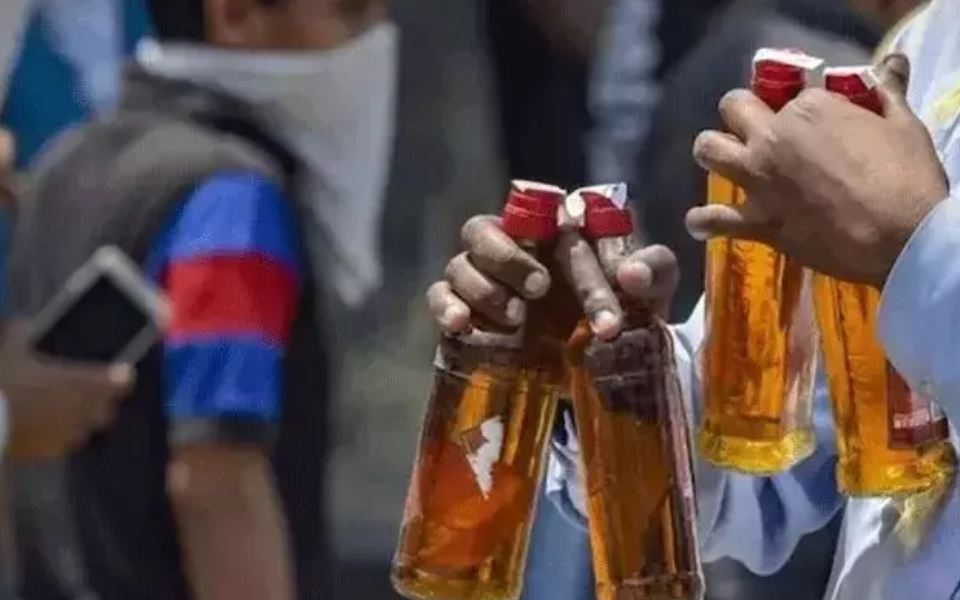Ahmedabad, Dec 23: The ruling Bharatiya Janata Party and the opposition Congress on Saturday clashed over the Gujarat government's decision a day earlier to allow liquor in GIFT City, which partially overturned the state's strict prohibition policy.
The state government, on Friday, lifted the ban on liquor in the Gujarat International Finance Tec-City with the aim of providing a "global ecosystem".
While the Congress and Aam Aadmi Party said it was an unfortunate decision that will ruin the youth, the BJP said it would provide proper environment for the development of business in the region.
"This is a very unfortunate decision. The BJP government wants to lift prohibition in the state and they have started it with GIFT city. Tomorrow they will say they want to lift liquor ban at the Statue of Unity (in Kevadia) and Tent City of Dhordo in Kutch to attract tourists as well as the Surat Diamond Bourse," Leader of Opposition Amit Chavda said.
"This will ruin the youth. Those who drink and come out of GIFT City will cause accidents and may harm our women. Do they (government) think lifting the liquor ban will attract investment," he questioned.
Congress MLA Ganiben Thakor said the decision must be withdrawn immediately in order to maintain law and order, dignity of women, adding that people will go to GIFT City to drink instead of going outside Gujarat.
Umesh Makwana, the AAP MLA from Botad, wrote to Chief Minister Bhupendra Patel seeking withdrawal of the decision to lift prohibition in GIFT City.
Countering these arguments, state minister Rushikesh Patel said the decision was taken for industry players who are coming from outside the state.
"This is a decision to provide same lifestyle to business leaders that they are used to in places where there is no liquor ban. Many foreign companies that have come to GIFT City are part of (Fortune) 500 plus companies. Let the Congress say what they want to but they will later understand the importance of this decision," Patel asserted.
In a statement on Friday, the Gujarat prohibition department had said GIFT City has emerged as a global financial and technological hub which is bustling with economic activities.
"An important decision has been taken on Friday to change rules to allow 'wine and dine' facilities in the GIFT City area to provide a global business ecosystem to global investors, technical experts and national and international companies," it said.
Under the new system, hotels, restaurants and clubs (existing and that will come up) in the GIFT City area will be given permits for wine and dine facilities, but they will not be allowed to sell liquor bottles to people, the statement pointed out.
Let the Truth be known. If you read VB and like VB, please be a VB Supporter and Help us deliver the Truth to one and all.
New Delhi (PTI): Police here have busted a crime syndicate involved in traffic fraud and extortion, arresting three people including the alleged mastermind who sold fake stickers to help commercial vehicles bypass no-entry restrictions, an official said on Saturday.
The police said they dismantled a third organised syndicate linked to traffic-related frauds, with the arrest of Rinku Rana alias Bhushan, his associate Sonu Sharma and Mukesh Kumar alias Pakodi, who was also connected to another extortion syndicate.
According to the police, Rinku Rana was running a well-organised network that facilitated the movement of commercial goods vehicles during restricted hours by selling fake 'marka' or stickers for Rs 2,000 to Rs 5,000 per vehicle every month. The stickers were falsely projected as authorisation to evade traffic challans.
During raids, the police recovered Rs 31 lakh in cash, property documents worth several crores of rupees, over 500 fake stickers and six mobile phones allegedly used to operate the syndicate.
The crackdown followed a complaint filed by a traffic police officer in April this year after a commercial vehicle tried to evade checking by producing a fake sticker claiming exemption from enforcement action.
Investigation revealed that social media groups were being used to coordinate the illegal movement of vehicles and alert drivers about traffic police checkpoints, police said.
"A parallel system was being run to cheat drivers and vehicle owners while undermining traffic enforcement. On the basis of evidence, provisions related to organised crime under the BNS were invoked," a senior police officer said.
Sonu Sharma, the police said, managed social media groups through which stickers were sold and real-time alerts were circulated regarding traffic police movement. He also acted as a link between Rana and drivers operating in the field.
In a related development, Mukesh Kumar alias Pakodi, an associate of Rajkumar alias Raju Meena, who was earlier arrested under the Maharashtra Control of Organised Crime Act (MCOCA), was also apprehended.
Mukesh allegedly helped extort money from transporters and was involved in blackmailing traffic police personnel by recording enforcement actions, the police said.
Investigators alleged the syndicate led by Rajkumar deployed drivers to deliberately violate traffic rules and secretly record police officials during challans, later using manipulated videos to extort money under threat of false allegations.
The police said that in total, eight accused belonging to three different organised crime syndicates linked to traffic frauds and extortion have been arrested so far.
Further investigation is underway to trace the remaining members, conduct financial probes, and analyse digital evidence recovered during the raids, officials added.





